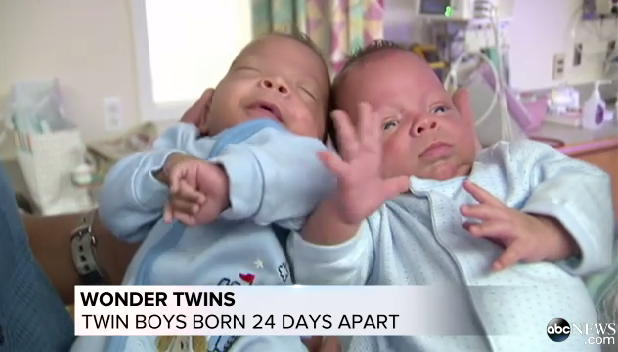Special Delivery: Boston Twin 'Miracle Babies' Born 24 Days Apart After Woman's Dilated Cervix Closes Back Up

A Boston woman’s dream of becoming a mother quickly turned into a reality when an ultrasound revealed she was pregnant with twins. Four months before her due date, 35-year-old Lindalva Pinheiro da Silva’s double delight quickly turned into fear as she went into premature labor on Feb. 27 and was immediately rushed to Tufts Medical Center. When potassium sulfate injections failed to calm da Silva’s contractions and stop her labor, the first twin, Alexandre, was born at just 1 lb., 10 oz., with the second twin, Ronaldo, following his brother’s footsteps 24 days later.
“I panicked,” she told ABC News, recalling her whirlwind delivery with Alexandre. “It wasn’t time. It was too early. I knew I could lose the babies.” Da Silva and her husband, Ronaldo Antunes, could hold the newborn in the pam of their hands, something that terrified the new mother. “He was crying, but he was very tiny and I was very scared. I said to my husband, ‘He’s too tiny.’”
Prior to Alexandre’s birth, doctors stopped da Silva’s labor and left the delivered child’s umbilical cord and placenta inside her womb. After he was born, his umbilical cord came out but was quickly cleaned and put back inside by doctors. This rare lifesaving procedure would ensure Ronaldo would be kept in the womb longer so he could grow more.
Delayed twin deliveries are so rare, they are not closely counted. In the journal Obstetrics & Gynecology, two large medical centers in Virginia and Tennessee reported just 14 cases over 12 years, out of 96,922 deliveries, according Tufts Medical Center. In most cases, mothers would have to have their cervix stitched up to keep the baby from coming, but da Silva was fortunate enough to beat the odds.
The Boston mother was given antibiotics to combat infection, since mothers need to be monitored very closely for early signs of infection, which can be common after the procedure. “The mother is the best place for a preterm baby to develop unless there is evidence of infection,” said Dr. Jennifer Ashton, a practicing OB/GYN, to ABC News. “Then, we have a saying: It’s better to deliver a very premature baby than to deliver a very premature and infected baby.” Luckily for da Silva, she did not contract any infection that would endanger Ronaldo’s health.
As Alexandre remained in the neonatal unit, da Silva began having contractions again on March 26, when Ronaldo was born at just 28 weeks and one day. Unlike his twin brother, Ronaldo was born like a regular baby at 6 lbs., 13 oz. and did not need a breathing tube. Now, both twin brothers remain in the hospital growing stronger, each weighing over 6 lbs.
Only time will tell whether the twins will experience any significant developmental delays and if the younger twin will have more problems than Ronaldo. Doctors do suspect he might need surgery down the road for eye problems and a hernia. The medical staff at Tufts, such as Dr. Geoffrey Binney Jr., associate chief of Newborn Medicine, believes the twins will be able to go home around the time of their original due date, June 18. “They are doing great,’’ he told the Boston Globe.
Da Silva remains hopeful of her twins’ future and is relieved. “They’re my miracle babies,” da Silva said. “Ronaldo because he stayed inside, and Alexandre because he’s a survivor.”



























